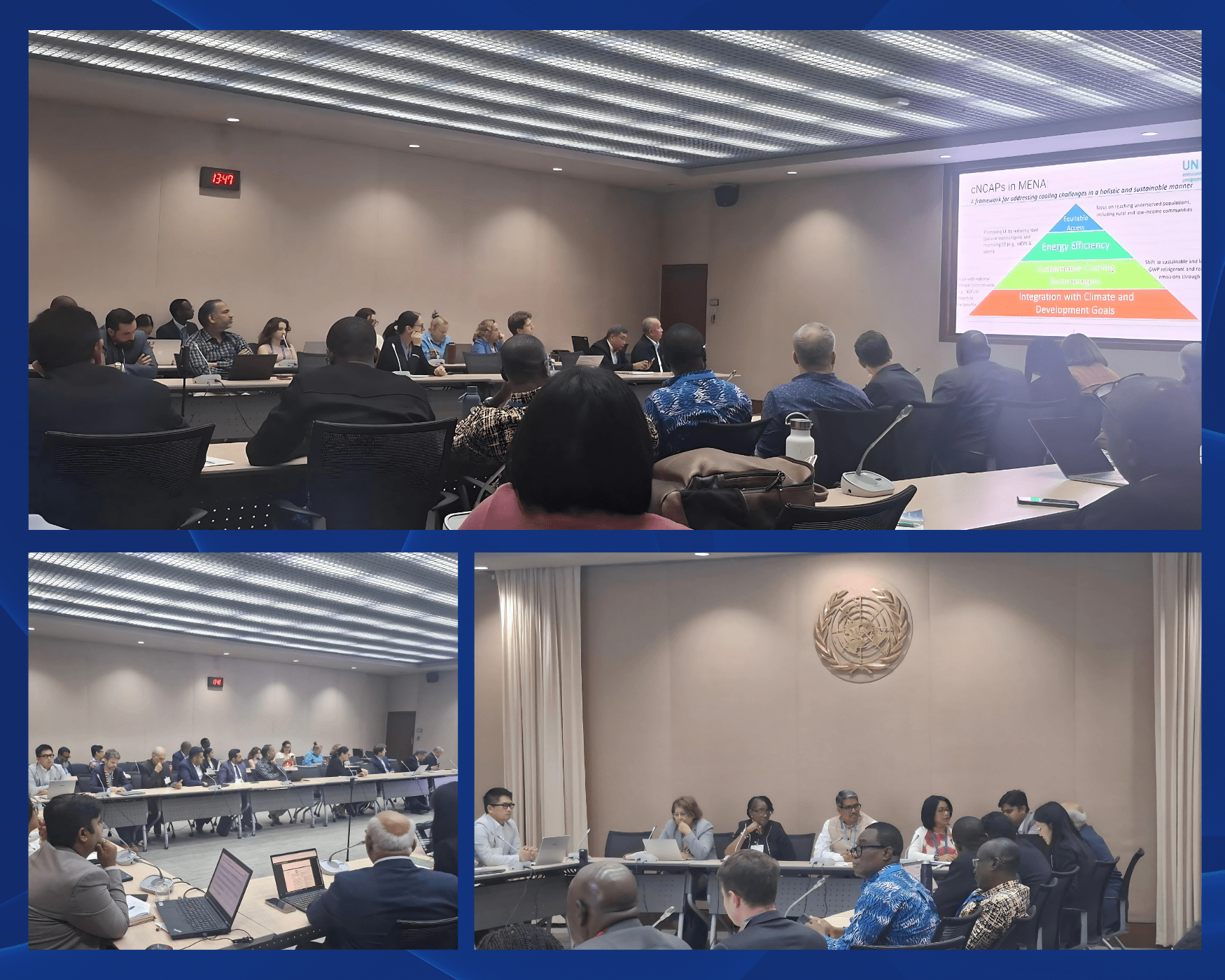Regional Collaboration on NCAPs
Spotlighted at OEWG-47
Amid intensifying climate risks and surging global heat extremes, National Cooling Action Plans (NCAPs) are fast becoming essential policy tools for delivering sustainable cooling at scale. By translating national and international commitments into practical, cross-sectoral measures across food systems, healthcare, housing, and energy, NCAPs empower governments to drive emissions reductions, bolster resilience, and improve public health.
To advance this agenda, the United Nations Environment Programme (UNEP) Cool Coalition and the Climate and Clean Air Coalition (CCAC) co-convened a high-level side event at the 47th Open-Ended Working Group (OEWG-47) of the Parties to the Montreal Protocol, on 9 July 2025, in Bangkok, Thailand. National Cooling Action Plans: Building Regional Synergies to Accelerate Implementation focused on how regional harmonization and improved access to finance can accelerate NCAP uptake.
Setting the stage, Mozaharul Alam, Regional Coordinator for Climate Action at UNEP Asia-Pacific Office, welcomed participants and emphasized the need to move from commitment to implementation through robust mechanisms and cross-sectoral coordination. He underscored that NCAPs, anchored in strong institutional frameworks, are key to helping countries deliver on the Kigali Amendment, their NDCs, and the Global Cooling Pledge, while supporting broader development and climate priorities.
Excellency Eunice Biritwum, Acting Executive Secretary of Ghana’s Energy Commission, reinforced this message by highlighting Ghana’s leadership in sustainable cooling. In her opening address, she spoke to the country’s commitment to the Global Cooling Pledge, the central role of NCAPs, and the importance of aligning cooling action with both national development and climate objectives.
Following the opening remarks, attention turned to regional innovation in NCAP development. Dr Omar Abdelaziz, Regional Expert, UNEP Cool Coalition, presented a technical overview of the Middle East and North Africa (MENA) regional NCAP methodology. Dr Abdelaziz outlined how a harmonized approach across countries can accelerate the development and implementation of NCAPs, emphasizing the potential of regional cooperation to scale up sustainable cooling solutions and achieve both climate and development objectives.
The panel discussion, moderated by Denise San Valentin, Programme Management Officer at the Climate and Clean Air Coalition and Manjeet Singh, Senior Project Specialist at the UNEP Cool Coalition, brought together national leaders and development partners to explore practical strategies for advancing NCAPs across regions.
Le Ngoc Tuan, Deputy Director General at Viet Nam’s Department of Climate Change, discussed how Viet Nam’s NCAP is designed to deliver on both Kigali Implementation Plans and enhanced NDCs, while pursuing new avenues for implementation finance. He noted that several important legal documents have recently been adopted, including a decree that formally recognizes the cooling sector within Viet Nam’s national policy framework. Through strengthened inter-ministerial coordination and innovative business models such as Cooling-as-a-Service, the NCAP is facilitating the adoption of climate-friendly cooling technologies and improved refrigerant management.
Janati Idrissi Rabia, National Ozone Officer at Morocco’s Ministry of Energy Transition and Sustainable Development, reflected on Morocco’s journey from refrigerant transition to developing its first NCAP, with an emphasis on cross-sectoral coordination and future cooling strategies.
From Japan, Makoto Kato, Senior Researcher at the Overseas Environmental Cooperation Center highlighted efforts to create synergies between climate change and refrigerant commitments, sharing policy lessons that could inform other countries’ approaches.
Balaji Natrajan, Programme Management Officer at the Multilateral Fund Secretariat, considered the evolving role of the Fund in supporting NCAPs and discussed how countries can leverage these plans to access additional resources and support aligned with KIPs.
Jie Pan, Regional Technical Advisor at UNDP, provided insights on facilitating inter-ministerial collaboration in NCAP design and highlighted enabling conditions for successful implementation.
Nils Hansen, Project Manager at GIZ Proklima, discussed the holistic potential of NCAPs in accelerating energy-efficient, climate-friendly cooling solutions, and outlined findings from the NDC Cooling Guide on integrating cooling into national climate plans.
Throughout the discussion, panellists remarked on the need for strong institutional coordination, innovative financing, and robust regional knowledge exchange to transform planning into real-world results. The discussion underscored that scaling sustainable cooling depends on adaptive approaches and strengthened partnerships across countries and sectors.
In closing, Manjeet Singh noted that NCAPs are increasingly serving as the linchpin connecting national cooling strategies and regional approaches, such as the MENA NCAP methodology, that enable valuable peer learning.
The momentum from OEWG-47 is set to propel even greater collaboration and action, with over 40 countries now developing or implementing NCAPs under the Global Cooling Pledge. As the Montreal Protocol community shapes the future of ozone and climate protection, NCAPs are ensuring that sustainable cooling becomes an accessible and central pillar of climate-resilient development.
For more information, contact Manjeet Singh.

